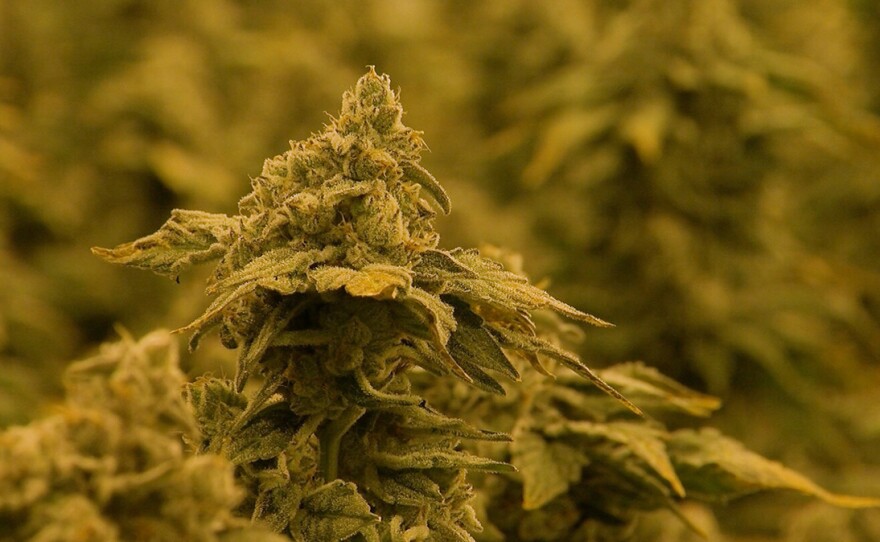April, specifically 4/20, is the month for celebrating cannabis. But people in San Diego’s pot industry also had a lot to cheer about in November, when voters ushered in a Democratic majority on the county Board of Supervisors for the first time in more than a generation.
And they partied again in January when the new majority reversed a ban on cannabis businesses in the county’s unincorporated areas. The vote came after years of work by cannabis advocates to both get this law changed and become players in local politics.
Industry insiders have established political action committees, including the Association of Cannabis Professionals and CA Coastal Pacific, that in San Diego have donated mostly to Democrats. They hope the candidates they support will focus on increasing the number of dispensary permits and approval for cannabis lounges countywide and in individual cities.
All told, the industry has contributed $315,000 to local candidates and Democratic Party since 2018. Here’s a breakdown:
-Association of Cannabis Professionals and CA Coastal Pacific gave $48,000 to the San Diego County Democratic Party
-Ghost Management LLC, who represents the cannabis delivery service WeedMaps, gave $28,000 to the San Diego County Democratic Party
-Ghost Management LLC gave $40,000 to a committee supporting Toni Atkins
-Association of Cannabis Professionals gave $25,000 to oppose Republican Supervisor Kristin Gaspar, who was running for reelection against Democrat Terra Lawson Remer
-Association of Cannabis Professionals gave $22,000 to support Democratic Supervisor Nathan Fletcher
Cannabis cash also went to the state Assembly campaigns of Lorena Gonzalez and Shirley Weber; Todd Gloria’s Assembly and mayoral campaigns; and Dave Myers’ unsuccessful campaign for San Diego County Sheriff. The only Republican to get cannabis money was Oceanside City Councilmember Jerry Kern when he ran for County Supervisor against Jim Desmond.
RELATED: Can A Cannabis Equity Program Work In San Diego?
To be clear, this spending is not on the same level as other big political contributors. For example, the San Diego Chamber of Commerce PAC spent at least $1,598,000 in the 2018 and 2020 election cycles; and the San Diego Police Officers Association PAC spent at least $507,000. But political watchers said they expect the cannabis industry’s influence to grow.
“There are other major players and cannabis could become one of those players in San Diego politics,” said UC San Diego politics professor Thad Kousser.
Kousser also said the fight for adult-use cannabis is now being waged at the local level rather than statewide. This means local political contributions are more important.
“Now the question is about where can you put a dispensary, where can you do agricultural production?” he said. “And that’s a land-use policy.”
Land is a precious commodity within the cannabis industry. The limited amount of licenses available to buy is one barrier most potential businesses face. Cities only permit a small number of cannabis businesses to operate at a time. The licenses are not cheap — Chula Vista is the most expensive with an initial $55,000 and up to another $47,000 in other additional big charges.
Tough rules
Cannabis attorneys say historically, the rules have been so restrictive in San Diego County that they try to steer their clients elsewhere.
“Time and time again, I tell these people, there are no opportunities right now in the San Diego area,” said Ed Wicker, an attorney who guides pot entrepreneurs through the permitting process. “How do you feel about going out to Desert Hot Springs or California City? It’s disheartening. Why can’t they have a lawful business that is something they could manage, close at home? San Diego governments are missing out on the revenue here and it’s been a dearth of business opportunities.”
Wicker said he’s excited to see what the Board of Supervisors does with cannabis in the coming months. The policy proposal they approved earlier this year provided the framework for supervisors to make a strong ordinance on cannabis, which could increase the number of businesses in unincorporated land. Only five are currently housed there.

Fletcher proposed a similar set of policies before but was outvoted by a Republican majority of supervisors in 2018. Fletcher said the county needed to catch up to modern times.
“The county of San Diego is one of the only governing entities that had this outright ban on cannabis products,” he said. “Not just recreational adult use, but medicinal. And that’s just inconsistent with the science, with the data, with what’s in the interest of public safety, and frankly, what we think is right.”
But Fletcher said he did not push these policy proposals because of his cannabis donors.
“I campaigned as an advocate for a safe, regulated and legal cannabis market,” he said. “It makes sense that voters who agree with that would vote for me. And it makes sense that individuals who agree with that might support my campaign, just like any other issue that we confront. But the reason we’re doing this is because it’s the right thing to do.”
Fletcher said one of the consultants who helped draft the policies was Dallin Young, a local cannabis advocate and lobbyist. Young and Fletcher go back a ways — Young was the field director for Fletcher’s mayoral run in 2013.
Young, who is now vice-chair of San Diego’s Cannabis Chamber of Commerce, said more dispensary licenses in San Diego and surrounding cities are essential.
“We have 36 licenses in the city of San Diego and 40 cannabis production facilities which encapsulate manufacturing, cultivation, and distribution,” he said. “If you allow for more licenses to be available, then you allow for more diversity in the marketplace because you deflate the value of those licenses.”
The next battle
San Diego County also limits where people can consume cannabis, Young said. He and other cannabis advocates will next push to allow lounges.
Lounges will allow veterans to consume cannabis — right now, they can’t if they live or work on federal property or subsidized housing. They also are places where tourists consume cannabis since it is illegal to smoke in most public places, including hotels, Young said.
Other cannabis advocates are starting to plan for a future beyond policy debates.
Lincoln Fish, CEO of the local cannabis business OutCo Labs, also put money into local elections and, like Young, has been a prominent consultant for the supervisors on cannabis policy. He wants the stigma and the “reefer madness” to finally burn out.
“Cannabis should be everywhere and it should be accessible. If we can do that, then we can focus on what's important: how can cannabis do more to help this cause, this issue, this disease,” Fish said. “How can cannabis be used to help with autism in kids and epilepsy and all of these things that we aren't really studying that we should. That's what I want to see happen.”






